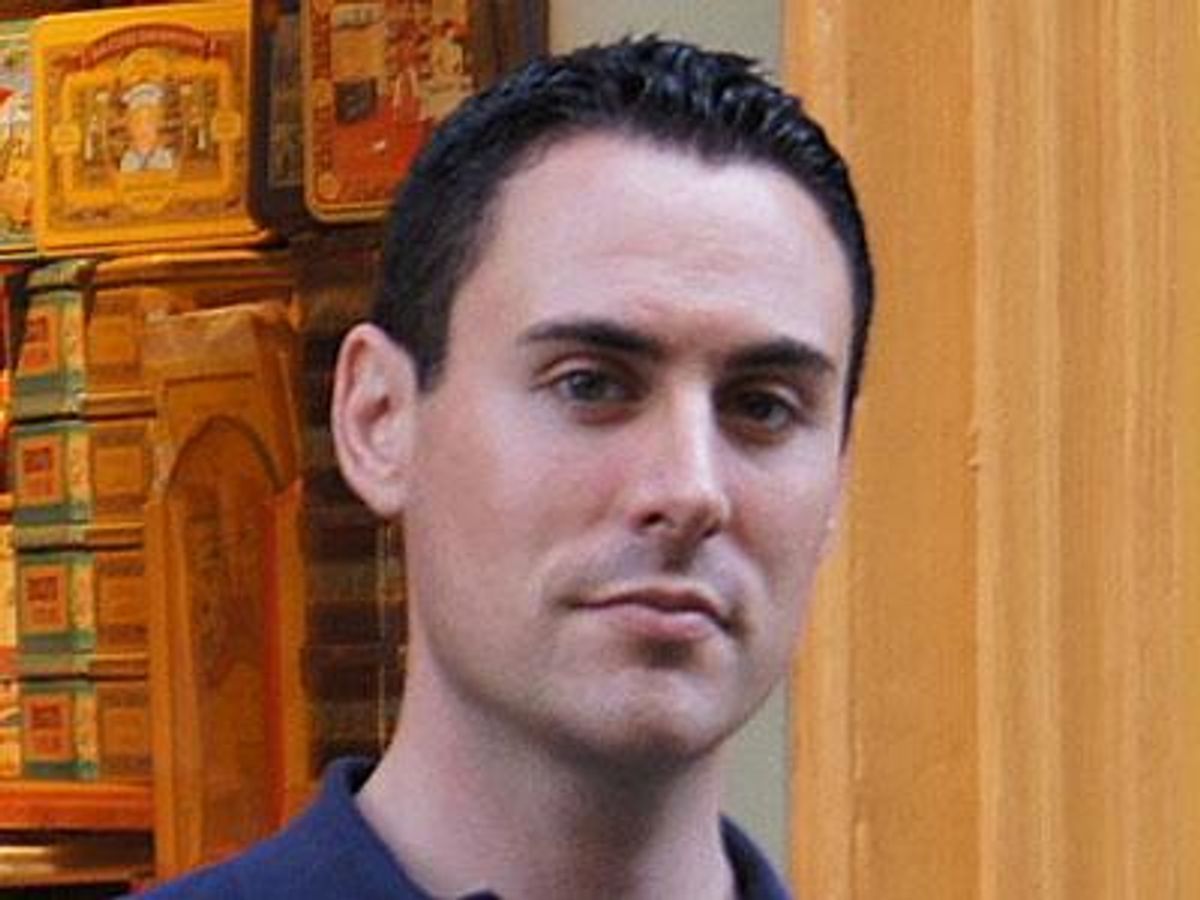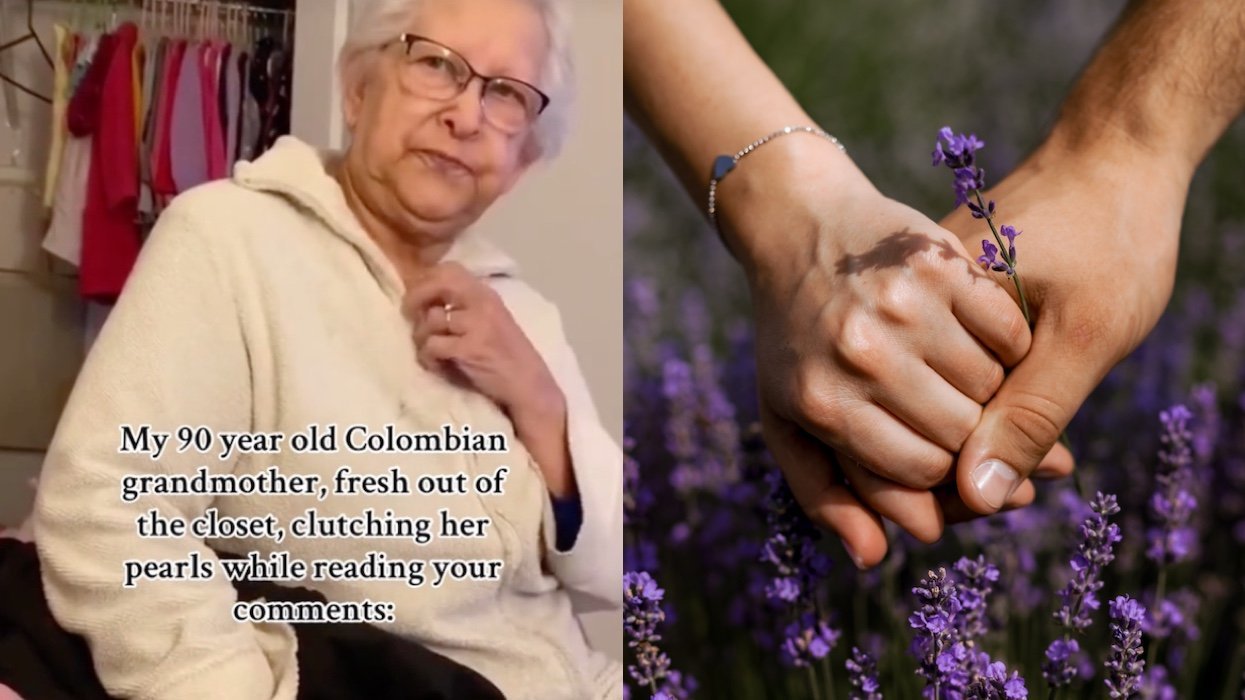Darren Spedale is anything but lazy. He's been an investment banker, lawyer, and small business owner. Now he's focusing on something totally different: co-parenting.
Spedale has started the company FamilyByDesign, which aims to partner folks who want to have children but do not necessarily have all the necessities -- such as sperm or an egg -- to do so. Before getting into co-parenting the StartOut founder also wrote a book on same-sex marriage with Oxford University Press.
Spedale took some time out of his busy schedule to answer a few questions about co-parenting.
The Advocate: What are parenting partnerships or co-parenting?
Darren Spedale: Parenting partnerships, sometimes called co-parenting relationships, are when persons who are not romantically linked to one another decide that they want to build a relationship that will lead to having and raising a child together.
How did you get interested in parenting partnerships, and why did you create FamilyByDesign?
This all began for me as a combination of the professional and the personal. On the professional side, I've been working on modern family issues my entire adult life. Of course, having come out in college, I've always been particularly interested in the emergence of the LGBT family.
In the mid-1990s, as an undergrad at Duke University, I began writing about domestic partnership benefits because at that time employers were struggling with the idea of whether they should extend health care benefits and other benefits to unmarried partners of their employees. I then received a Fulbright scholarship to research non-traditional families in Europe, and as part of that research looked at countries that had given the rights of same sex marriage to couples, which became the basis for the book Gay Marriage: For Better or for Worse?. That book discredited the argument by social conservatives that bad things would happen to a society if their gay and lesbian citizens were given the rights of marriage. I've been doing further research on modern families ever since. So that's the professional side.
The personal side is that I always thought that by my mid-thirties, I'd be settled down with my other half, with 2.2 kids and the house with the white picket fence. When I hit that point in my life and found myself still single, I started to feel my own biological clock ticking, and that got me thinking about what my own options for parenting would be. Initially, I thought my only choices were to be a good uncle for my nieces and nephews, or take on the responsibility of single parenting. I wanted to be more than just an uncle, and in terms of single parenthood I felt that the scheduling and financial pressures on a single parent, in addition to the lack of emotional support, would be too much for me to handle. So it got me thinking, "are there any other options"?
At that time, I spoke with two friends of mine about this who both said, separately, "I know this woman you should meet. She wants to be a mom but she doesn't want to be a single mom." So I ended up going on these "dates." We met at a bar and we had a drink and talked. Although the chemistry wasn't right in those particular situations to move forward with a parenting partnership, it really got me thinking: I have to read the book on how you do this whole co-parenting thing. And then I realized there wasn't a book! And so I started FamilyByDesign to provide the information and resources people would need to successfully find and build a relationship with a co-parent or co-parents.
How does FamilyByDesign help people to find a parenting partner?
Parenting partnerships occur when you bring like-minded people together who are at a similar point in their lives where they are ready to become parents, but are not in an opposite-sex relationship where parenting would occur on its own. The concept of parenting partnerships is to bring these people together to begin a dialogue with each other about parenting.
It can be a single person looking for a person of the opposite sex to be their parenting partner, it can be a lesbian couple or gay male couple who may be looking for a person of the opposite sex to play that role in a child's life, or a gay male couple co-parenting with a lesbian couple - there are various forms of parenting partnerships that are possible.
Family By Design is broken up into three sections -- "Learn," "Find," and "Share." The "Learn" section provides in-depth information about parenting partnerships and provides a step-by-step "co-parenting guide" from the beginning to end of the process.
The "Find" section works similarly to a dating website, but asks in-depth questions about your personal thoughts on parenting. For example, you can indicate in your profile what level of day-to-day involvement you plan to have vs. your co-parent. You can indicate your financial commitment to the co-parenting structure. There are many other thoughtful parenting questions in these profiles so that potential parenting partners can find a highly-compatible match.
The "Share" section is where the community shares together -- it includes professional experts and successful co-parents who answer the questions of site users in a "Dear Abby" format, and also includes forums where prospective co-parents can share best practices, questions, concerns, etc with each other.
What do you think brings people to co-parenting? And how is it different from adoption, surrogacy and other forms of raising a child?
There are many wonderful ways today to create an LGBT family. Which direction you choose for yourself will depend on what's important to you -- or not important to you -- in a family structure. It's wonderful to see how many children have found a home in LGBT families through adoption, and surrogacy has also led to many happy new families as well.
The biggest difference I'd note is that co-parenting is optimal for people who want to be parents, but aren't currently in a family structure that they feel is optimized for their family. Co-parenting allows you to share the scheduling support, the financial support, and the emotional experiences of parenting with another person or persons. It also provides a child with more parental resources and support as well.
In relation to surrogacy, which can easily cost upwards of $100k, co-parenting may be a more viable option financially for many people. And in relation to adoption, there are some people for whom being a biological parent is important, and co-parenting can help with that option.
Lesbian couples may choose co-parenting over anonymous sperm donors because they want a male figure -- perhaps even a father figure -- in their child's life. In other cases, they may have started off simply wanting their child to know who their biological father was, but over time the "known donor" became more and more involved in being part of their child's life as well in a natural way.
For gay male couples who have chosen to co-parent with either a lesbian couple or a single woman, I sometimes hear that they wanted to become parents but were concerned they wouldn't be able to make it happen because they both work and have incredibly busy lives, and were not sure they could be full-time, live-in dads -- so they wanted the support of another parent in their child's life.
Are there different ways to co-parent?
Absolutely! It's going to depend on what the prospective co-parents want. I've seen some co-parenting arrangements where everything is split 50-50 in terms of rights, responsibilities, finances, etc. I've seen others where there's more of a "primary parent" / "secondary parent" relationship, where one parent or set of parents has a much greater role with the child than the other parent(s). Sometimes the latter is structured more as a "known donor" relationship where the "donor dad" is expected to play a role in their child's life.
There are lots of other iterations to co-parenting -- for example, some co-parents live in the same house or building as each other, though most live apart. Sometimes one co-parent takes on all the financial responsibilities, though they are usually split in some manner. As long as all parenting partners want the same thing, there are many ways to successfully co-parent.
What advice would you give to people who may be interested in finding a parenting partner?
I've learned three key things from my interviews with people who have successfully gone into a parenting partnership:
First, you should take the time you need to build a strong bond of friendship, and a relationship of trust, and comfort with the other person(s), before getting pregnant. So that timeframe can be different for different people. For most people, just a few months isn't long enough to get to know each other. You're signing up for a lifetime commitment, so take the time to hang out with each other, get to know each other's friends and family members, etc. You might want to spend time with your prospective co-parent(s) around children and see how they interact. As you get to know each other, you'll build an open and honest channel of communication with each other which will be important later on.
Second, as you're getting to know one another, start the conversation about what's important to you in terms of parenting. Family by Design includes a co-parenting template in the legal section of the site, where we give you a detailed list of issues that you should consider as part of your conversations. For example, will each of you be a legal parent? How will you allocate parental rights and responsibilities? Who has the right to name the child? What should a child's diet consist of? We help you think about many of the issues you haven't yet considered, but should.
Third, once you've done all the aforementioned planning and taken the time to get to know your parenting partner(s), expect everything to change. Because once the baby is born, there will be many unforeseeable issues and challenges that will inevitably come up. That's why it's so important that when you get to these challenges, that you've built a relationship with your co-parent(s) that's strong enough and flexible enough to deal with them.
Contact reporter Alex Davidson on Twitter at twitter.com/adwildcat


















































































